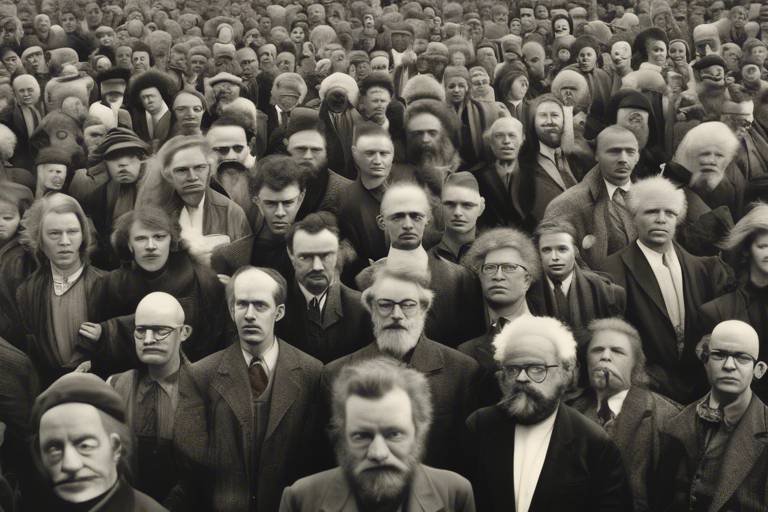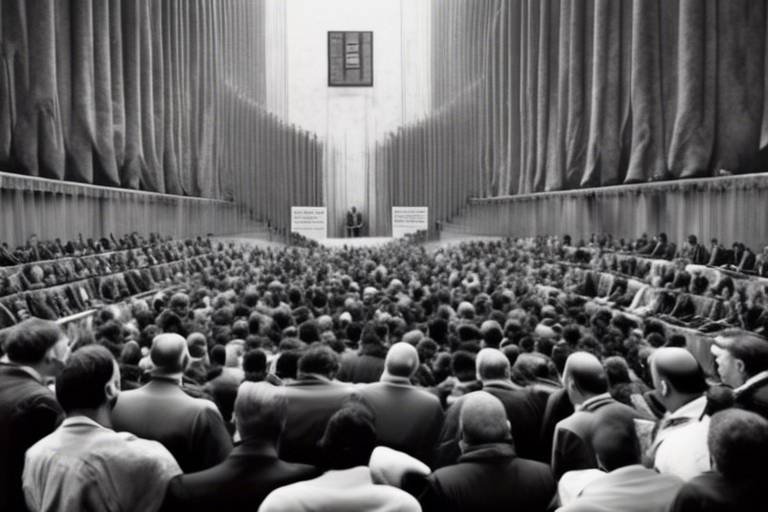Philosophy and Politics: The Duality of Human Nature
The interplay between philosophy and politics is a fascinating journey through the complexities of human existence. At its core, this relationship is shaped by our understanding of human nature, which serves as both the foundation and the battleground for political ideologies. As we explore this intricate duality, we uncover how philosophical ideas about what it means to be human influence governance, ethics, and the very structures of our societies. From ancient thinkers who pondered the essence of justice to contemporary debates on the nature of power, the threads of philosophy weave through the fabric of political life, revealing the profound impact of our beliefs on the world we create.
Throughout history, philosophers have grappled with the question of what drives human behavior. Are we inherently good or evil? Do we seek power for its own sake, or do we aspire to create a just society? These questions are not merely academic; they have real-world implications that shape our political landscapes. For instance, the belief in a fundamentally altruistic human nature may lead to more democratic and inclusive governance, while a more cynical view might justify authoritarian regimes that prioritize control over freedom.
Moreover, the duality of human nature manifests in the ongoing struggle between individual rights and collective good. This tension is a hallmark of political discourse, where the challenge lies in balancing personal freedoms with the needs of the community. As we dissect these philosophical underpinnings, we begin to see how they inform our political decisions and the ethical frameworks that guide our leaders. This exploration not only enhances our understanding of political systems but also encourages us to reflect on our own beliefs and values as active participants in the political arena.
In essence, the relationship between philosophy and politics is a dynamic dance, where each influences the other in a continuous loop. By examining historical perspectives alongside contemporary implications, we gain insights into how our beliefs about human nature can lead to vastly different political outcomes. Whether we advocate for a government that prioritizes the common good or one that champions individual liberties, our philosophical stance ultimately shapes the trajectory of our societies.
Examining the roots of political philosophy reveals how ancient thinkers laid the groundwork for modern political thought. Their views on human nature continue to shape contemporary political ideologies and practices.
Ethics plays a crucial role in politics, guiding leaders in making moral choices. This section explores how philosophical frameworks inform ethical governance and the implications of ethical dilemmas in political contexts.
Utilitarianism, a consequentialist theory, emphasizes the greatest good for the greatest number. This subheading discusses its influence on policy-making and the challenges it presents in addressing individual rights versus collective welfare.
The application of utilitarian principles can lead to significant societal changes. This section analyzes both the positive outcomes and potential ethical pitfalls associated with utilitarian policies in governance.
Critics argue that utilitarianism can overlook minority rights and lead to morally questionable decisions. This discussion evaluates these critiques and their relevance in contemporary political debates.
Virtue ethics emphasizes character and moral integrity in leadership. This part explores how cultivating virtues among political leaders can enhance public trust and foster ethical governance.
Human nature profoundly impacts political structures and institutions. This section examines how different political systems reflect varying understandings of human behavior and motivations.
The contrast between authoritarian and democratic systems illustrates differing views on human nature. This analysis discusses how these systems cater to or challenge inherent human tendencies toward power and freedom.
Social contract theory posits that individuals consent to governance for mutual benefit. This subheading explores its philosophical underpinnings and relevance to modern political agreements and civic responsibilities.
- What is the relationship between philosophy and politics? Philosophy provides the foundational ideas and ethical frameworks that shape political ideologies and practices.
- How does human nature influence political systems? Different understandings of human behavior lead to varying political structures, such as democracy or authoritarianism.
- What is utilitarianism in politics? Utilitarianism is a theory that promotes actions that maximize happiness and well-being for the majority, often leading to ethical dilemmas in governance.
- Why is ethics important in political decision-making? Ethics guide leaders in making moral choices that impact society, ensuring that governance aligns with societal values and principles.

The Historical Foundations of Political Philosophy
Examining the roots of political philosophy reveals a fascinating journey through time, where ancient thinkers laid the groundwork for modern political thought. Imagine walking through the bustling streets of Athens, where philosophers like Socrates, Plato, and Aristotle debated the nature of justice, governance, and the ideal state. Their ideas were not just academic musings; they were reflections of human nature itself, grappling with questions that still resonate today. What is the role of the individual in society? How should power be distributed? These questions were not merely theoretical; they were essential for understanding the fabric of society.
Take Plato, for instance. In his work The Republic, he envisioned a society governed by philosopher-kings, individuals whose wisdom and virtue would guide the state towards the common good. This idea stemmed from his belief that human nature is inherently rational, and that the pursuit of knowledge leads to a just society. However, Plato's idealism also raises pertinent questions: Can we truly trust leaders to act in the best interests of the populace? Or does the pursuit of power inevitably corrupt even the most virtuous among us?
Fast forward to Aristotle, who provided a more pragmatic approach. He believed that humans are social creatures, naturally inclined to form communities and governments. His concept of the polis emphasized the importance of civic engagement and the role of ethics in governance. Aristotle's insights into human behavior laid the foundation for various political ideologies that would emerge in the centuries to follow. He argued that the best government is one that balances the interests of the many with the needs of the few, a notion that continues to challenge political theorists today.
As we delve deeper into history, we encounter the Enlightenment thinkers, such as John Locke and Thomas Hobbes, who further explored the implications of human nature on political systems. Locke's vision of the social contract emphasized individual rights and the idea that governance should be based on consent. He famously stated that people are entitled to life, liberty, and property, suggesting that the role of government is to protect these rights. In contrast, Hobbes offered a more cynical view of humanity, arguing that without a strong, central authority, life would be "solitary, poor, nasty, brutish, and short." This stark contrast between Locke's optimism and Hobbes's pessimism illustrates the ongoing debate about the fundamental nature of humanity and its implications for governance.
To summarize, the historical foundations of political philosophy are deeply intertwined with our understanding of human nature. The ideas of ancient philosophers continue to echo through the halls of modern political thought, influencing contemporary governance and ethical considerations. As we navigate the complexities of today's political landscape, reflecting on these foundational concepts can provide valuable insights into the challenges we face. The interplay between philosophy and politics is not just an academic exercise; it is a crucial aspect of our daily lives, shaping the structures that govern us and the ethical frameworks that guide our choices.
- What is political philosophy? Political philosophy is the study of fundamental questions regarding governance, justice, rights, and the role of individuals within society.
- Who are some key figures in political philosophy? Key figures include Socrates, Plato, Aristotle, John Locke, and Thomas Hobbes, each contributing significantly to our understanding of political systems and human nature.
- How does human nature influence political systems? Human nature shapes political systems by influencing how power is distributed, how laws are created, and how individuals interact within society.
- What is the social contract theory? Social contract theory posits that individuals consent to form a government for mutual benefit, establishing rules and responsibilities in exchange for protection and order.

The Role of Ethics in Political Decision-Making
Ethics is not just a buzzword tossed around in political circles; it is the very backbone that supports the structure of governance. When political leaders make decisions, they are often faced with moral dilemmas that require not only a keen understanding of the law but also a solid ethical framework. This framework guides them in evaluating what is right or wrong, just or unjust, and ultimately shapes the policies that affect the lives of citizens. Without ethics, political decision-making can devolve into a chaotic free-for-all, where power trumps morality, and the needs of the many are overlooked in favor of the few.
Imagine a world where political leaders make decisions solely based on personal gain or public opinion, disregarding ethical considerations. It would be like a ship sailing without a compass—lost and aimless. Ethical governance, on the other hand, acts as that compass, providing direction and purpose. It ensures that leaders remain accountable to their constituents and that their actions reflect the values and principles of the society they serve.
Philosophical frameworks play a vital role in shaping these ethical considerations. For instance, many political leaders draw from various ethical theories to inform their policies. Some of the most prominent frameworks include:
- Deontology: Focuses on rules and duties, emphasizing that certain actions are inherently right or wrong, regardless of their consequences.
- Utilitarianism: Advocates for actions that maximize overall happiness, weighing the benefits against the potential harm.
- Virtue Ethics: Stresses the importance of moral character and virtues in guiding ethical behavior.
These frameworks provide leaders with tools to navigate complex moral landscapes. However, they can also lead to conflicts. For example, a leader might face a situation where a utilitarian approach suggests sacrificing the well-being of a minority for the greater good. Here, ethical dilemmas arise, forcing leaders to confront uncomfortable questions about justice and fairness.
Moreover, the implications of ethical decision-making extend beyond individual leaders. They shape entire political systems and cultures. When ethical considerations are prioritized, it fosters a climate of trust and collaboration among citizens. Conversely, when ethics are ignored, it can lead to widespread disillusionment and unrest. The consequences can be dire, ranging from public protests to the erosion of democratic institutions.
In summary, ethics is not merely an abstract concept; it is a crucial element in political decision-making. It influences everything from policy formulation to public trust, and its absence can lead to a breakdown of governance. As we navigate the complexities of modern politics, it is essential to maintain a focus on ethical principles, ensuring that political leaders are held accountable and that their decisions reflect the moral values of the society they represent.
- What is the importance of ethics in politics?
Ethics in politics ensures that decisions are made with moral integrity, fostering trust and accountability between leaders and citizens. - How do ethical frameworks influence political decisions?
Ethical frameworks provide leaders with guidelines for evaluating complex moral dilemmas, helping them to make informed decisions that align with societal values. - What are the consequences of ignoring ethics in political decision-making?
Ignoring ethics can lead to corruption, public disillusionment, and a breakdown of trust in political institutions.

Utilitarianism and Governance
Utilitarianism, at its core, is a philosophical theory that suggests that the best action is the one that maximizes utility, which is often defined as the greatest happiness for the greatest number. This principle has had a profound impact on political governance, shaping policies and decisions that aim to benefit the majority of citizens. But how does this translate into the real world? Imagine a government that must decide between funding a new healthcare program or investing in infrastructure. A utilitarian approach would analyze which option would yield the most significant overall benefit to the population. This decision-making process is not as straightforward as it sounds, as it often involves weighing complex factors and potential outcomes.
In practice, utilitarianism can guide leaders in crafting policies that prioritize collective welfare. For instance, during a public health crisis, such as a pandemic, utilitarian principles might advocate for measures like lockdowns or vaccination mandates to protect the majority, even if these actions infringe on individual liberties. This raises a critical question: at what point does the pursuit of the greatest good for the greatest number begin to undermine individual rights? The tension between collective benefit and personal freedom is a persistent challenge in utilitarian governance.
One of the significant advantages of utilitarianism in governance is its emphasis on measurable outcomes. Policymakers can assess the effectiveness of their decisions by looking at tangible results, such as improved health statistics or economic growth. However, this focus on outcomes can lead to ethical dilemmas, particularly when the rights of minorities are at stake. For example, if a policy benefits 90% of the population but severely disadvantages a small group, should it be implemented? This scenario illustrates the potential pitfalls of a purely utilitarian approach, where the needs of the few may be sacrificed for the happiness of the many.
To better understand the implications of utilitarianism in governance, let's consider a table that showcases some of its key strengths and weaknesses:
| Strengths of Utilitarianism | Weaknesses of Utilitarianism |
|---|---|
| Promotes overall societal welfare | Can overlook minority rights |
| Encourages measurable outcomes | May lead to morally questionable decisions |
| Provides a clear framework for decision-making | Risk of justifying harmful actions for the majority's benefit |
As we navigate the complexities of governance, the influence of utilitarianism remains evident. It encourages leaders to think critically about the consequences of their actions and to strive for policies that uplift the majority. Yet, the challenge lies in balancing this pursuit with a commitment to justice and the protection of individual rights. Ultimately, the debate surrounding utilitarianism in governance invites us to reflect on our values and the kind of society we wish to create.
- What is utilitarianism? Utilitarianism is a philosophical theory that advocates for actions that maximize happiness and well-being for the majority.
- How does utilitarianism affect political decision-making? It encourages leaders to consider the outcomes of their policies and prioritize the greatest good for the greatest number.
- What are the main criticisms of utilitarianism? Critics argue that it can neglect minority rights and justify unethical actions if they benefit the majority.
- Can utilitarianism coexist with individual rights? While challenging, it is essential for a balanced approach to governance that respects both collective welfare and individual freedoms.

Consequences of Utilitarian Policies
The application of utilitarian principles in governance can lead to profound societal changes, shaping the way policies are crafted and implemented. At its core, utilitarianism seeks to maximize overall happiness and minimize suffering, often leading to decisions that prioritize the greater good. However, this quest for collective welfare can yield a complex array of consequences, both positive and negative, that warrant careful examination.
On one hand, utilitarian policies can drive significant advancements in public health, education, and economic equality. For instance, when governments allocate resources to programs that benefit the majority—such as universal healthcare or free education—they often see a boost in overall societal well-being. These initiatives can create a ripple effect, enhancing quality of life for the populace at large. However, the focus on the majority can sometimes lead to the neglect of minority groups, raising ethical questions about whose happiness is prioritized.
Consider the following table that illustrates some of the potential consequences of utilitarian policies:
| Positive Consequences | Negative Consequences |
|---|---|
| Increased public health outcomes | Marginalization of minority rights |
| Enhanced economic growth | Potential justification for unethical actions |
| Improved educational access | Short-term solutions over long-term sustainability |
While the benefits of utilitarian policies can be significant, the ethical pitfalls are equally noteworthy. One major concern is that the pursuit of the greatest good can lead to morally questionable decisions. For example, if a government decides to implement a policy that sacrifices the rights of a small group for the benefit of the majority, it raises serious ethical dilemmas. This can manifest in various ways, such as through legislation that disproportionately affects marginalized communities or through economic policies that favor the wealthy at the expense of the poor.
Moreover, utilitarianism can sometimes prioritize short-term gains over long-term consequences, leading to policies that may appear beneficial initially but result in adverse effects over time. For instance, a government might cut funding for environmental protections to boost economic growth, which could lead to severe ecological degradation in the future. Such scenarios highlight the importance of a balanced approach that considers not just the immediate outcomes but also the broader implications of policy decisions.
In summary, while utilitarian policies can lead to significant improvements in societal welfare, they also present numerous ethical challenges that must be navigated with care. The duality of their consequences serves as a reminder that the path to the greater good is often fraught with moral complexities. As we continue to explore the intersection of ethics and governance, it is crucial to remain vigilant about the potential impacts of our choices on all members of society.
- What is utilitarianism? Utilitarianism is a philosophical theory that suggests the best action is the one that maximizes overall happiness or well-being for the greatest number of people.
- How can utilitarianism affect policy-making? Utilitarianism can influence policy-making by encouraging decisions that prioritize collective welfare, often leading to resource allocation towards programs that benefit the majority.
- What are the criticisms of utilitarian policies? Critics argue that utilitarian policies can overlook the rights of minorities, justify unethical actions, and prioritize short-term benefits over long-term sustainability.
- Can utilitarianism be applied in all political contexts? While utilitarianism can provide a useful framework for decision-making, its application may vary depending on the specific political, cultural, and ethical contexts involved.

Critiques of Utilitarianism
Utilitarianism, while a popular ethical framework, is not without its critics. One of the most pressing concerns is that this consequentialist theory can often lead to the infringement of minority rights. In the quest to maximize happiness for the majority, the needs and rights of smaller groups can be overlooked or outright ignored. This raises a fundamental question: is it morally acceptable to sacrifice the well-being of a few for the greater good? Critics argue that this approach can lead to morally questionable decisions, where the ends justify the means, potentially resulting in harm to vulnerable populations.
Another critique centers around the measurement of happiness. How do we quantify happiness or suffering? The subjective nature of these experiences makes it incredibly challenging to create a universal standard for decision-making. For instance, consider a scenario where a government must decide between funding a new highway or investing in mental health services. The highway might benefit more people in the short term, but the long-term benefits of mental health support could lead to a happier society overall. This dilemma highlights the complexities of utilitarian calculations and the potential for significant oversight.
Moreover, critics often point out that utilitarianism can lead to a slippery slope of moral relativism. If the principle of the greatest good for the greatest number is taken to its extreme, it could justify actions that are otherwise considered unethical. For example, in dire situations, such as wartime, utilitarian reasoning might support drastic measures that violate human rights in the name of achieving a perceived greater good. This brings us to the ethical implications of such decisions, which can have ripple effects throughout society.
Additionally, the emphasis on outcomes can overshadow the importance of intentions and character. Critics of utilitarianism argue that it fails to account for the moral integrity of individuals making decisions. If leaders are solely focused on outcomes, they may engage in manipulative or deceitful practices to achieve their goals, undermining public trust and ethical governance. This raises another crucial question: should the motivations behind decisions hold as much weight as the consequences they produce?
In light of these critiques, utilitarianism remains a contentious topic in political philosophy. While it offers a compelling framework for thinking about ethics in governance, the potential for overlooking minority rights, the difficulty in measuring happiness, the risk of moral relativism, and the neglect of intentions all pose significant challenges. As we navigate the complexities of political decision-making, it is essential to balance utilitarian principles with a commitment to ethical integrity and respect for all individuals.
- What is utilitarianism? Utilitarianism is an ethical theory that suggests the best action is the one that maximizes overall happiness or well-being.
- What are the main critiques of utilitarianism? Critics argue that it can infringe on minority rights, is difficult to measure happiness, leads to moral relativism, and neglects the importance of intentions.
- How does utilitarianism apply to politics? Utilitarianism influences political decision-making by prioritizing policies that aim to achieve the greatest good for the greatest number of people.

Virtue Ethics in Political Leadership
When we think about political leadership, one might wonder what truly defines a great leader. Is it their ability to make tough decisions, or perhaps their knack for rallying support? While these traits are important, they often overshadow a fundamental aspect: the leader's character. Virtue ethics, a philosophical approach that emphasizes moral integrity and character, offers a profound lens through which we can evaluate political leadership. This perspective suggests that the essence of effective governance lies not just in policies or strategies, but in the virtues that leaders embody and promote.
At its core, virtue ethics posits that good character is essential for making ethical decisions. This means that leaders who cultivate virtues such as honesty, courage, and compassion are more likely to inspire trust and loyalty among their constituents. Imagine a political leader who consistently demonstrates integrity; such a leader not only gains respect but also creates a culture of accountability within their administration. In contrast, leaders lacking these virtues may find themselves mired in scandals and public distrust, ultimately undermining their effectiveness.
Furthermore, the cultivation of virtue among political leaders can have a ripple effect throughout society. When leaders exemplify virtuous behavior, they set a standard for others to follow. This can lead to a more ethical political environment, where citizens feel empowered to engage in civic duties and hold their leaders accountable. As Aristotle famously stated, "We are what we repeatedly do. Excellence, then, is not an act, but a habit." This idea underscores the importance of virtuous leadership in fostering a robust democratic society.
However, the application of virtue ethics in politics is not without challenges. For instance, the diverse values and beliefs within a society can complicate the consensus on what constitutes a virtue. Different cultures may prioritize different traits, leading to potential conflicts in leadership styles. Additionally, the pressure of political competition can sometimes push leaders to compromise their values for the sake of expediency or electoral success. Therefore, it is crucial for leaders to remain vigilant and committed to their ethical principles, even in the face of adversity.
To further illustrate the impact of virtue ethics in political leadership, consider the following table that highlights key virtues and their corresponding benefits in governance:
| Virtue | Benefits in Governance |
|---|---|
| Integrity | Builds trust and credibility with constituents |
| Courage | Enables leaders to make difficult decisions for the common good |
| Compassion | Fosters empathy and understanding in policy-making |
| Justice | Promotes fairness and equity in governance |
In conclusion, virtue ethics offers a compelling framework for understanding the role of character in political leadership. As we navigate the complexities of governance, it is essential to recognize that the virtues leaders embody can significantly influence not only their effectiveness but also the overall health of our democratic institutions. Ultimately, a commitment to virtue can pave the way for a more ethical and responsible political landscape, one where leaders are not just powerful figures but also moral exemplars.
- What is virtue ethics? Virtue ethics is a philosophical approach that emphasizes the role of character and virtues in moral philosophy, suggesting that good character leads to ethical behavior.
- How does virtue ethics apply to political leadership? It suggests that leaders with strong moral character are more likely to inspire trust, make ethical decisions, and foster a positive political environment.
- What are some key virtues important for leaders? Integrity, courage, compassion, and justice are often cited as essential virtues for effective political leadership.
- Can virtue ethics address the challenges of diverse values in society? While it recognizes the complexity of differing cultural values, virtue ethics emphasizes the importance of dialogue and consensus-building to navigate these differences.

The Influence of Human Nature on Political Systems
Human nature is a complex and multifaceted concept that has a profound impact on the way political systems are structured and function. At the core of political philosophy lies the understanding that human beings are not just passive recipients of governance; rather, they are active participants whose behaviors, motivations, and inherent traits shape the very fabric of political life. This relationship between human nature and political systems can be observed through various lenses, including the motivations behind governance, the design of political institutions, and the dynamics of power.
To grasp the influence of human nature on political systems, one must consider the fundamental characteristics that define humanity. Are we primarily self-interested beings, or do we possess an innate sense of altruism? These questions have been debated by philosophers for centuries, and the answers often dictate the kind of political system that emerges in a society. For instance, a belief in the inherently selfish nature of humans might lead to the establishment of authoritarian regimes, where power is concentrated in the hands of a few who exert control to maintain order and stability. In contrast, a more optimistic view of human nature might encourage democratic systems that promote individual freedoms and collective decision-making.
Different political systems reflect varying understandings of human behavior. For example, in a democracy, the assumption is that individuals are rational actors capable of making informed choices for the common good. This faith in human judgment fosters an environment where civic engagement and public discourse are encouraged. Conversely, authoritarian systems often operate on the premise that individuals are not to be trusted with power, leading to restrictions on freedom and a centralized approach to governance. The table below illustrates these contrasting perspectives:
| Political System | View of Human Nature | Implications |
|---|---|---|
| Democracy | Rational and capable of self-governance | Encourages participation, freedom, and accountability |
| Authoritarianism | Self-interested and unreliable | Concentrates power, limits freedoms, and suppresses dissent |
Furthermore, the influence of human nature extends beyond the structure of political systems to the very essence of political behavior. How leaders govern often reflects their understanding of human motivations. Leaders who believe in the potential for cooperation and collective benefit may implement policies that promote social welfare and public goods. On the other hand, those who view human nature through a lens of competition and conflict may prioritize policies that favor individual gain over communal well-being.
Another critical aspect to consider is how political systems adapt to the changing perceptions of human nature over time. Historical events, cultural shifts, and social movements can reshape the collective understanding of what it means to be human, thereby influencing governance. For instance, the rise of social movements advocating for civil rights and equality has prompted many democratic societies to reevaluate their policies and practices, reflecting a growing recognition of the diverse nature of humanity.
In summary, the influence of human nature on political systems is profound and multifaceted. It shapes the design of institutions, the behavior of leaders, and the engagement of citizens. As we navigate the complexities of modern governance, understanding this duality becomes essential. The political landscape is not merely a reflection of laws and regulations; it is a living organism, constantly evolving in response to our collective understanding of who we are as human beings.
- How does human nature affect democracy?
Human nature influences democracy by shaping the belief in citizens' capacity to make rational decisions, which underpins democratic ideals of participation and accountability.
- Can authoritarian regimes change their view of human nature?
Yes, authoritarian regimes can adapt their policies and approaches based on changing perceptions of human nature, often in response to social movements or external pressures.
- What role do leaders play in shaping political systems?
Leaders play a crucial role by interpreting human nature through their policies and governance styles, which can either empower citizens or suppress their freedoms.
- Is it possible for a political system to balance individual rights and collective welfare?
Yes, many democratic systems strive to find a balance between individual rights and collective welfare, although achieving this balance can be challenging and often requires ongoing dialogue and reform.

Authoritarianism vs. Democracy
When we talk about authoritarianism and democracy, we're diving into two distinct philosophies that reflect our understanding of human nature and our approach to governance. On one hand, authoritarianism operates under the belief that a strong central authority is necessary to maintain order and control. It often assumes that humans are inherently chaotic and need guidance. On the other hand, democracy champions the idea that individuals are capable of self-governance, suggesting that people are rational beings who can make informed decisions about their lives and societies.
Authoritarian regimes often arise from a fear of instability. Leaders may argue that a firm hand is required to prevent societal collapse, which can resonate with citizens who have experienced chaos or conflict. This perspective reflects a rather pessimistic view of human nature, implying that without strict rules and oversight, individuals will act in self-interest, leading to disorder. In contrast, democracies are built on the belief that collective decision-making can lead to better outcomes. They encourage participation, debate, and the exchange of ideas, fostering a sense of community and shared responsibility.
So, how do these two systems manifest in real life? Let's take a closer look at some key differences:
| Aspect | Authoritarianism | Democracy |
|---|---|---|
| Power Structure | Concentrated in a single leader or party | Distributed among elected representatives |
| Public Participation | Limited or suppressed | Encouraged and protected |
| Freedom of Speech | Restricted; dissent is often punished | Protected; diverse opinions are valued |
| Decision-Making | Top-down approach | Consensus-building and deliberation |
Both systems reflect different aspects of human behavior and societal needs. While authoritarianism may provide quick decision-making in times of crisis, it often comes at the cost of personal freedoms and civil rights. Democracy, while potentially slower due to the need for consensus and debate, allows for a more inclusive approach where the voices of the many can be heard. This fundamental difference raises the question: which system truly serves humanity better?
Moreover, the tension between these two forms of governance often leads to a fascinating dance of power. In many societies, we see elements of both systems coexisting, creating a hybrid model. For example, some democratic nations may adopt authoritarian measures during emergencies, blurring the lines between governance styles. This leads us to consider how human nature—our desires for freedom, security, and order—shapes the political landscape.
Ultimately, the debate between authoritarianism and democracy is not just about governance; it's a reflection of our deepest beliefs about human nature. Are we, as a species, inherently good and capable of self-governance, or do we require oversight to ensure order and stability? As we navigate these complex questions, it becomes clear that the interplay between philosophy and politics is as intricate as the very fabric of human society.
- What defines authoritarianism? Authoritarianism is characterized by the concentration of power in a single authority, with limited political freedoms and restricted civil liberties.
- How does democracy differ from authoritarianism? Democracy emphasizes public participation, individual rights, and the distribution of power among elected representatives, promoting a system of checks and balances.
- Can a democracy adopt authoritarian measures? Yes, during crises, democratic governments may implement temporary authoritarian measures, raising concerns about the erosion of civil liberties.
- What impact does human nature have on political systems? Human nature influences political structures by shaping our beliefs about governance, whether we lean towards the need for control or the desire for freedom.

The Social Contract Theory
The Social Contract Theory is a fascinating concept that has shaped political thought for centuries. At its core, this theory suggests that individuals come together to form a society by agreeing, either explicitly or implicitly, to surrender some of their freedoms to a governing body in exchange for protection and the benefits of communal living. Imagine it like a giant handshake, where everyone agrees to play by the same rules to ensure a smoother ride through life. This idea has profound implications for understanding our responsibilities as citizens and the legitimacy of authority.
Historically, philosophers like Thomas Hobbes, John Locke, and Jean-Jacques Rousseau have contributed significantly to the development of social contract theory, each presenting their unique views on human nature and governance. Hobbes, for instance, had a rather pessimistic view of humanity, believing that without a strong central authority, life would be "solitary, poor, nasty, brutish, and short." In contrast, Locke had a more optimistic outlook, arguing that people are generally reasonable and can govern themselves, thus justifying limited government intervention. Rousseau, on the other hand, emphasized the idea of the "general will," suggesting that true freedom is achieved when individuals collectively agree on the laws that govern them.
The implications of social contract theory extend far beyond philosophical discussions; they resonate in our everyday lives and political systems. For instance, when citizens vote, they are actively participating in this social contract, expressing their consent to be governed by the rules and regulations set forth by their elected officials. This participation is crucial because it reinforces the idea that authority is not merely imposed from above but is derived from the consent of the governed.
Moreover, the social contract serves as a foundation for understanding civic responsibilities. Individuals must recognize that their rights come with corresponding duties. For example, paying taxes, obeying laws, and participating in civic activities are all part of this mutual agreement. If one side of the contract fails to uphold its end, it can lead to unrest and dissatisfaction among the populace. This is why social contract theory remains relevant today, as it provides a framework for evaluating the legitimacy of governments and the rights of citizens.
To illustrate the differences in how social contract theory is interpreted, let’s look at a simple comparison table:
| Philosopher | View on Human Nature | Government Role |
|---|---|---|
| Thomas Hobbes | Pessimistic; humans are self-interested | Strong, central authority to prevent chaos |
| John Locke | Optimistic; humans are rational | Limited government, protecting natural rights |
| Jean-Jacques Rousseau | Believes in the inherent goodness of people | Facilitates the general will for common good |
In conclusion, the social contract theory is more than just an abstract philosophical concept; it is a vital framework that informs our understanding of governance, individual rights, and societal responsibilities. By recognizing the nuances of this theory, we can better appreciate the delicate balance between authority and liberty, and how our collective agreements shape the world we live in today.
- What is the social contract theory? The social contract theory posits that individuals consent to form a society and abide by its rules in exchange for protection and benefits.
- Who are the key philosophers associated with social contract theory? Key figures include Thomas Hobbes, John Locke, and Jean-Jacques Rousseau, each offering different perspectives on human nature and governance.
- Why is the social contract important? It helps us understand the legitimacy of government authority and the responsibilities of citizens within a society.
Frequently Asked Questions
- What is the relationship between philosophy and politics?
The relationship between philosophy and politics is deeply intertwined. Philosophy provides the foundational ideas and ethical frameworks that influence political systems and governance. Political ideologies often stem from philosophical perspectives on human nature, morality, and justice. Essentially, philosophy shapes the way we think about power, rights, and the role of government in society.
- How does human nature influence political systems?
Human nature plays a crucial role in shaping political systems. Different political ideologies reflect varying assumptions about human behavior—whether people are inherently cooperative or self-interested. For instance, authoritarian regimes often operate on the belief that individuals require control, while democratic systems emphasize freedom and individual rights. Understanding these perspectives helps us analyze why certain political structures emerge and persist.
- What is utilitarianism, and how does it impact governance?
Utilitarianism is a philosophical theory that advocates for actions that maximize overall happiness or well-being. In governance, this means creating policies aimed at achieving the greatest good for the greatest number. While utilitarianism can lead to beneficial outcomes, it also raises ethical concerns, especially when individual rights are sacrificed for the collective benefit. This balance between collective welfare and personal rights is a significant challenge for policymakers.
- What are the critiques of utilitarianism?
Critics of utilitarianism argue that it can lead to morally questionable decisions, particularly regarding minority rights. They contend that focusing solely on the majority's happiness may overlook the needs and rights of individuals or marginalized groups. This critique is essential in contemporary political debates, where the balance between collective good and individual rights remains a contentious issue.
- How does virtue ethics apply to political leadership?
Virtue ethics emphasizes the importance of character and moral integrity in leadership. In a political context, cultivating virtues among leaders can enhance public trust and promote ethical governance. When leaders embody virtues like honesty, courage, and empathy, they are more likely to make decisions that reflect the values and interests of the populace, ultimately fostering a healthier political environment.
- What is social contract theory?
Social contract theory posits that individuals consent to form a government in exchange for protection and the benefits of organized society. This philosophical concept underlines the idea that political authority derives from the consent of the governed. It remains relevant today as it informs discussions on civic responsibilities and the legitimacy of political agreements, emphasizing the mutual obligations between citizens and their government.



















